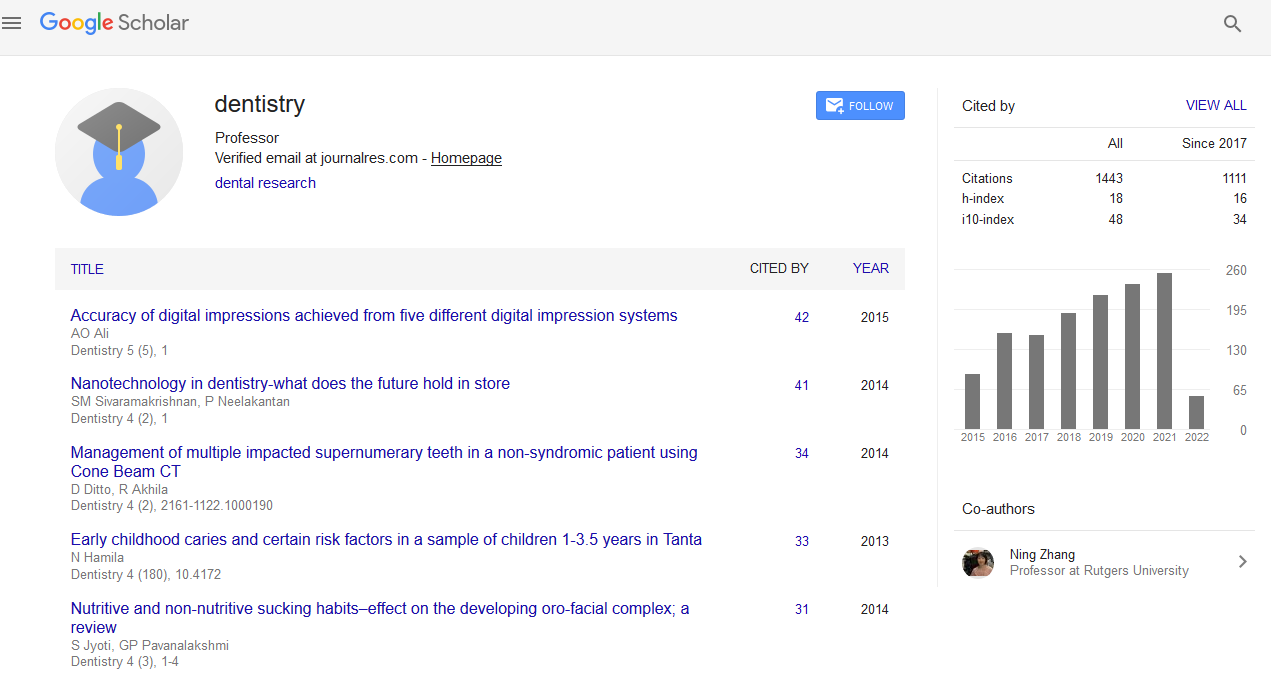Citations : 1817
Dentistry received 1817 citations as per Google Scholar report
Indexed In
- Genamics JournalSeek
- JournalTOCs
- CiteFactor
- Ulrich's Periodicals Directory
- RefSeek
- Hamdard University
- EBSCO A-Z
- Directory of Abstract Indexing for Journals
- OCLC- WorldCat
- Publons
- Geneva Foundation for Medical Education and Research
- Euro Pub
- Google Scholar
Useful Links
Share This Page
Journal Flyer

Open Access Journals
- Agri and Aquaculture
- Biochemistry
- Bioinformatics & Systems Biology
- Business & Management
- Chemistry
- Clinical Sciences
- Engineering
- Food & Nutrition
- General Science
- Genetics & Molecular Biology
- Immunology & Microbiology
- Medical Sciences
- Neuroscience & Psychology
- Nursing & Health Care
- Pharmaceutical Sciences
Fixed and removable prosthodontics in the rehabilitation of the worn and or depleted dentition
15th Euro Congress on Dental & Oral Health
October 24-26, 2016 Rome, Italy
Paul F Gregory
University of Leeds, UK
Keynote: Dentistry
Abstract:
Various demographic surveys from around the world show a continual decline in the overall rates of edentulousness and an increased rate of tooth retention. However tooth loss of one to several teeth is still a not uncommon occurrence, be it from; caries, periodontal disease or trauma and this tendency towards gradual tooth loss increases with age. Counterpointed against tooth loss are varying levels of tooth tissue loss from parafunctional activities (bruxism), abrasion, attrition and or erosion and with differential levels of tooth over eruption, tilting and or dento-alveolar compensation. Osseo-integrated implants may be seen as a "gold" standard treatment for the rehabilitation of missing teeth but their costs, requirements for surgical intervention and ongoing maintenance requirements can preclude this treatment option from many of our patients. It is here that conventional and adhesive fixed partial dentures (bridges) and possibly in combination with removable partial dentures and adhesive restorations still provides valuable treatment options for our patients with worn and or depleted dentitions. This lecture will outline a variety of different treatment modalities used in replacing missing teeth and tooth tissue loss utilizing; conventional fixed bridgework, adhesively retained restorations & bridgework and the integration of crowns and removable partial dentures and applicable to the general dental practitioner. Clinical tips are highlighted throughout the lecture for dental practitioners to aid in their management of some of these very challenging cases when seen in practice. The use of the re-organization approach to the worn and or depleted dentition will be compared and contrasted against the use of the conformative approach. Clinical examples will be used to highlight techniques and taken from clinical practice, undergraduate & postgraduate clinical teaching. The research evidence will be presented as the underpinning foundations for a methodical approach to the clinical management & importantly the biological costs of the different treatment options for each of the prosthodontic options chosen in replacing missing teeth. Finally, the role of the patient and the impact on their oral health of different interventions can be accessed through the use of Oral Health Related Quality of Life (OHRQoL) studies.
Biography :
Paul F Gregory has graduated from University of Leeds in March 1981. He has undertaken orthograde endodontics, surgical endodontics, non-surgical periodontal treatment and surgical periodontics in combination with the above restorative options for advanced restorative cases over the years he had been in practice.
Email: p.f.gregory@leeds.ac.uk


